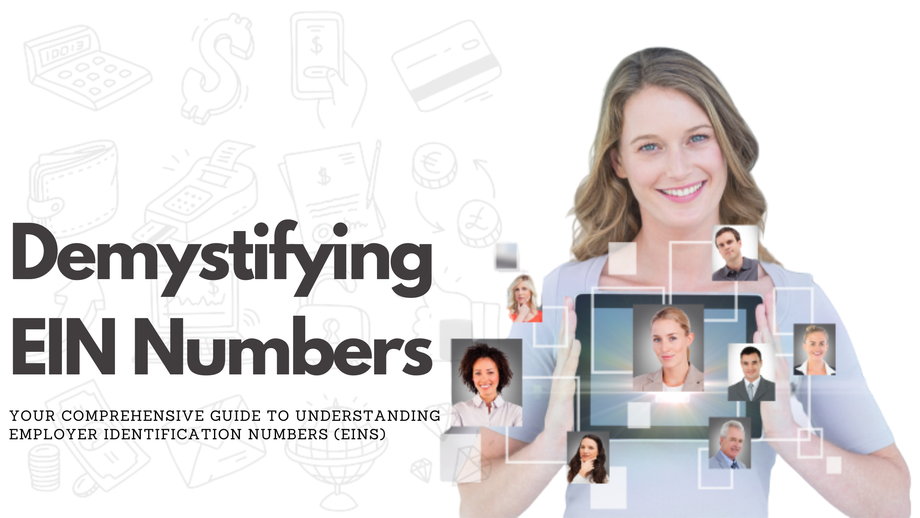In the world of business, acronyms often dominate conversations. One such acronym you may have come across is EIN. But what exactly is an EIN number, and why does it matter?
Don't worry; we're here to demystify it all for you.
What is an EIN Number?
An EIN number, or Employer Identification Number, is a unique nine-digit identifier assigned by the Internal Revenue Service (IRS) to businesses and other entities operating in the United States. Think of it as your company's social security number. This number helps the IRS keep track of your business for tax purposes, making it an essential element of your financial journey.
Why Do You Need an EIN Number?
Now that you know what an EIN is, let's delve into why it's crucial for your business:
- Taxation:
The primary purpose of an EIN is to ensure accurate and efficient taxation. It allows the IRS to track your business's financial transactions, file tax returns, and manage tax liabilities effectively. Without an EIN, you might face difficulties when filing taxes, potentially leading to penalties and legal issues.
- Legal Requirements:
Many legal structures, such as corporations, partnerships, and LLCs, are required to obtain an EIN. Even if your business isn't legally obligated to have one, obtaining an EIN is still advisable for various reasons, including financial security and credibility.
- Hiring Employees:
If your business plans to hire employees, an EIN is a must. It's used for payroll taxes, reporting employee wages, and other employment-related tax obligations. Additionally, it separates your personal and business finances, simplifying record-keeping.
- Opening a Business Bank Account:
Most banks require an EIN when opening a business bank account. This separation of personal and business finances is essential for financial clarity and limited liability protection.
- Building Business Credit:
Having an EIN enables your business to establish its own credit profile. This can be incredibly beneficial when seeking loans or financing opportunities, as it separates your business's creditworthiness from your personal credit history.
Who Needs an EIN Number?
EINs are not limited to large corporations. Any business entity, including sole proprietors, partnerships, LLCs, and non-profit organizations, can apply for an EIN if they meet certain criteria. Here's a breakdown:
Sole Proprietors:
While not required, sole proprietors can obtain an EIN to separate business and personal finances. This can help protect personal assets and simplify tax reporting.
Partnerships:
Partnerships are legally required to have an EIN. Each partner's share of profits and losses is reported to the IRS using this number.
Corporations:
All corporations, regardless of size, must have an EIN. This includes C corporations, S corporations, and non-profit corporations.
LLCs:
Most Limited Liability Companies (LLCs) need an EIN. If your LLC has multiple members or employees, it's essential to obtain one.
Non-Profit Organizations:
Non-profit organizations, including charities and educational institutions, require an EIN for tax-exempt status and financial reporting.
How to Obtain an EIN Number
Now that you understand the importance of an EIN, let's discuss how to get one:
- Online Application:
The quickest and most convenient way to obtain an EIN is through the IRS's online application. You can complete the application in minutes, and you'll receive your EIN immediately upon approval.
- Fax Application:
If you prefer a paper application, you can fill out Form SS-4 and fax it to the IRS. You'll receive your EIN within a few business days.
- Mail Application:
You can also mail the completed Form SS-4 to the IRS. This method takes the longest, with processing times of up to four weeks.
- Apply by Phone:
In the United States, you can apply for an EIN by calling the IRS. An agent will assist you in completing the application over the phone.
Keeping Your EIN Updated
Once you have an EIN, it's crucial to keep the IRS informed of any changes to your business, such as a change in legal structure or ownership. You can do this by filing Form 8822-B, the Change of Address, or Responsible Party – Business.
Wrapping Up:
In summary, an EIN number, or Employer Identification Number, is a vital component of your business's financial and legal landscape. It's essential for taxation, legal compliance, hiring employees, and building business credit. Obtaining an EIN is a straightforward process that can be completed online in a matter of minutes.
So, whether you're a small business owner, a non-profit organization, or part of a larger corporation, understanding and obtaining an EIN should be a top priority. It's a critical step on your journey toward financial security, legal compliance, and business growth.
Don't delay; get your EIN today and pave the way for a successful and thriving business future.

